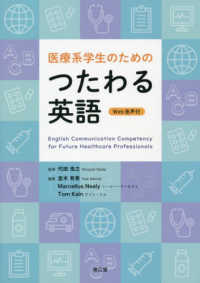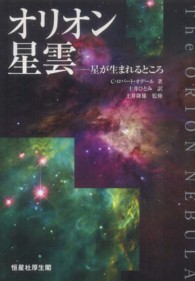- ホーム
- > 洋書
- > 英文書
- > History / World
Full Description
Confessionalisation and Erudition in Early Modern Europe examines the consequences of the sixteenth-century Reformation for the study of ancient texts and of the past in general. The volume offers the most comprehensive account thus far of the relationship between religious identity-formation and the history of knowledge in early modern Europe.
Contents
Preface
Contributors
1: Dmitri Levitin: Introduction: Confessionalisation and erudition in early modern Europe: a comparative overview of a neglected episode in the history of the humanities
2: Arnoud Visser: Juan Luis Vives and the organisation of patristic knowledge
3: Madeline McMahon: Matthew Parker and the practice of church history
4: Anthony Grafton: Scaliger's chronology: early patterns of reception
5: Nicholas Hardy: Roman Catholic biblical scholarship in the age of confessions: the case of Lucas Holstenius and the Barberini circle
6: Simon Ditchfield: The Limits of Erudition: Daniello Bartoli SJ (1608-85) and the Misson of Writing History
7: Aurélien Girard: Was an Eastern Scholar Necessarily a Cultural Broker in Early Modern Europe? Faustus Naironus (1628-1711), the Christian East, and oriental studies
8: Jean-Louis Quantin: Confessional history and the authority of erudition: Bossuet, Burnet, and the English Reformation
9: Dmitri Levitin and Scott Mandelbrote: Becoming heterodox in seventeenth-century Cambridge: the case of Isaac Newton
10: Jan Loop: Language of Paradise: Protestant oriental scholarship and the discovery of Arabic poetry
Appendix I: Joseph Beaumont's Determination on Newton's theology disputation, February 1677







